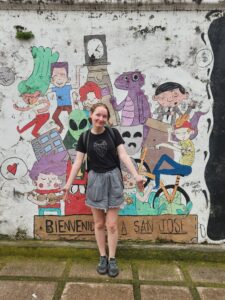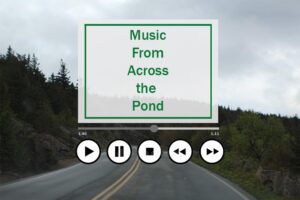
This past week, I experienced more of Bulgaria, as I traveled within the country. I have so far only seen Blagoevgrad, where I live, and briefly Sofia, the capital. I went on a school-led trip to Dobrinishte, a ski and resort town near the ski resort Bansko. This is located in the Pirin mountain range in southwest Bulgaria, a little over an hour away and deeper into the mountains from Blago.
It was colder in Dobrinishte than it was in Blagoevgrad, although there is still no snow. It is by far the mildest winter I have ever experienced, as although it is mid-February, it feels like late April in Maine.
In Dobrinishte, we stayed in a hotel and spa. Dobrinishte can only be described as a small and traditional Bulgarian village, with red-roofed huts and a small town square that is Soviet-esque. There are not many shops, but traditional Bulgarian restaurants abound on every corner. We had trouble finding places to buy snacks or alcohol, because there were only a couple of very tiny convenience shops that were too small to fit more than about four people at one time.
We all were crowded into one shop on Friday night, and the cashier, who spoke two words of English, spoke to us in Bulgarian for some time with us staring blankly before saying in English, “outsider?” We nodded. However, Bulgaria is a unique country in that nodding up and down means “no,” and back and forth means “yes,” which is the opposite from what we do in the U.S. and in most other countries. To make things even more confusing, the younger Bulgarians have started nodding the Western way, so you can never be too sure if they mean yes or no.
We ate at a traditional Bulgarian restaurant on Saturday night, and experienced the typical Bulgarian service. Although we arrived before any other customers, we received our food late, and at different times from one another. I tried some very strong homemade wine with my dinner, and the glass was filled to the brim. As is also custom in Bulgaria, hardly any restaurants accept cards as payment, or are willing to split checks. We spent a good 15 minutes trying to pool our leva (Bulgarian currency) and referenced a menu to figure out who owed what amount. Tipping is also very confusing, as it is not custom to tip much for anything, and so is usually about 10 percent of the bill. However, some Bulgarians don’t really tip, so it is hard to know when to do it and for how much.
Finally, we visited Bansko, the ski resort, for about two hours on Sunday afternoon on our way home, just to sightsee in the small resort town. There were also many traditional restaurants, as well as dozens of souvenir shops. Here and in Blagoevgrad, it is normal for the one salesperson working at the store to stand outside, trying to draw passersby inside, until a customer walks in, at which point they will come back inside.
Most shops are tiny in Bulgaria, and leave little standing room with very low ceilings. Most shopkeepers speak no English. I have learned a few phrases for asking how much something is and how to say “good afternoon” or “hello,” or “thank you.” Other than that, I manage to get by without many words exchanged. I hope I will continue to get used to these customs and this different body language, as it is simply a part of being immersed in a different culture and is all a part of the study abroad adventure.







